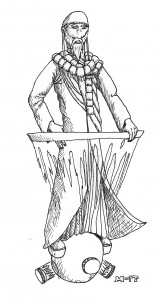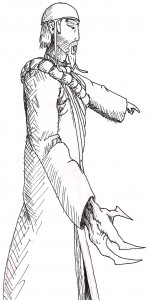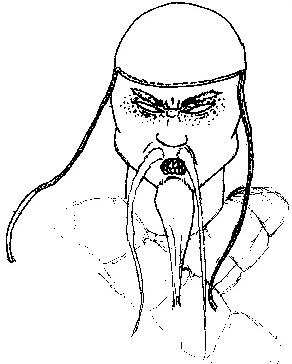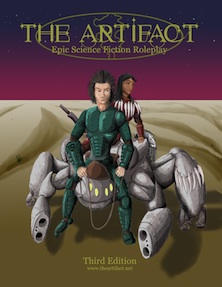Thank You to those brave souls that submitted their RPG Elevator Pitches! It’s August 4th and so the contest is now closed. The official entries are in the comments of the original post and can be viewed HERE. I’ll pick one of the entries tomorrow, in the mean time if one of them grabs your attention, let me know in the comments.
John Michael Crovis submitted this entry
Movies, Video Games, Television, Books – what do these have in common? They are all multibillion dollar industries that tell stories – and we pay a premium price for them. There is an alternative, more interactive than video games, for pocket change! Let me tell you about role playing games…
Bubba Brown recorded some entries for us.
FLAC: http://www.bestwithstuff.com/YoureRolePlayingNow.flac
WAV: http://www.bestwithstuff.com/YoureRolePlayingNow.wav
Chainsaw Aardvark gave us the bulk of our entries
* A book, a few friends, a handful of dice, and limitless possibility.
* Some people play for a couple of points and bragging rights. Others gamble for a few dollars. When we play, we save worlds.
* You take the blue book – the story begins, you wake up in an unknown star-ship, and believe you’re near Centauri Prime. You take the red book – you stay in Wonderland and I show you how deep the Labyrinth goes. (Yes, this paraphrased from “The Matrix”)
* Because you can’t but “last of their kind transhuman space-pirate destined to topple the empire” on your actual resume.
* Batteries, lag, network outages, our style of role-playing has none of that.
* Sixty dollars spent on videogames grants you twenty hours of staring at a screen, shouting at people you’ve never met. Sixty dollars spent on RPG materials means months of adventures with your best friends.
If you want to go anywhere and be anything, all you need is a few rules in your head and dice in your hand.
Its like being the star of your own movie. With no props, script, budget, or back end scale compensation rights. (OK, You might not be Alec McGuninness, but you can still have fun.)
Good stories end when you close the book. Great stories continue when you open the book with friends.
Thrives on Thursday, Smugglers Saturday, Mercenaries Monday – but heroes all the time. RPGs make the world a better place, one roll at a time.
Critical thinking, resource management, probability, asset optimization, strategic movement, negotiation – skills for real life, and skills for players. Make yourself a better person, one die at a time.
The first rule is have fun. The rest is just details.
Rule number one is enjoy the game. Rule seven-hundred fifty-eight has something to do with four-slice toasters, but it probably won’t come to that.
If you don’t find it awesome, you just simply haven’t found the game that fits you yet. Keep trying, there is an RPG for you out there.
Last but not least, Dan Houser came over from RPG.net to give us three entries.
You’ve been shot in the arm by federal agents, you’re on the top of a tenement slum, and they’re just about to break down the roof access door. What do you do?
The young man in your arms is unconscious, but thankfully your superhuman abilities may get him to the hospital in time…when a fire breaks out between you and the ER. What do you do?
I roll dice, and I find out. That’s a role-playing game.
 My wife and I often joke that I never do the same job twice. I just pick up a job that I’ve never done before and they keep employing me. So what about planning a campaign like that? Pick, or even better randomly roll for a skill, then build a game based on that skill. If you want to let the players in on the concept, that’s up to you. I’d keep it a secret and see how long it takes them to figure it out. There will be some frustration because it’s likely you’ll hit some skills that the players don’t have. If skills can be used untrained, then let the players struggle through. If not, include some way of them employing someone who does have that skill. Don’t have an NPC steal the spotlight, have the game be about finding the expert and getting them to the place they need to ply their trade. Then just gloss over them doing their job. I’d only roll for their success if there’s a time restraint or other pressure the players have to deal with while the NPC is doing what they do.
My wife and I often joke that I never do the same job twice. I just pick up a job that I’ve never done before and they keep employing me. So what about planning a campaign like that? Pick, or even better randomly roll for a skill, then build a game based on that skill. If you want to let the players in on the concept, that’s up to you. I’d keep it a secret and see how long it takes them to figure it out. There will be some frustration because it’s likely you’ll hit some skills that the players don’t have. If skills can be used untrained, then let the players struggle through. If not, include some way of them employing someone who does have that skill. Don’t have an NPC steal the spotlight, have the game be about finding the expert and getting them to the place they need to ply their trade. Then just gloss over them doing their job. I’d only roll for their success if there’s a time restraint or other pressure the players have to deal with while the NPC is doing what they do.




 The Free RPG Blog
The Free RPG Blog